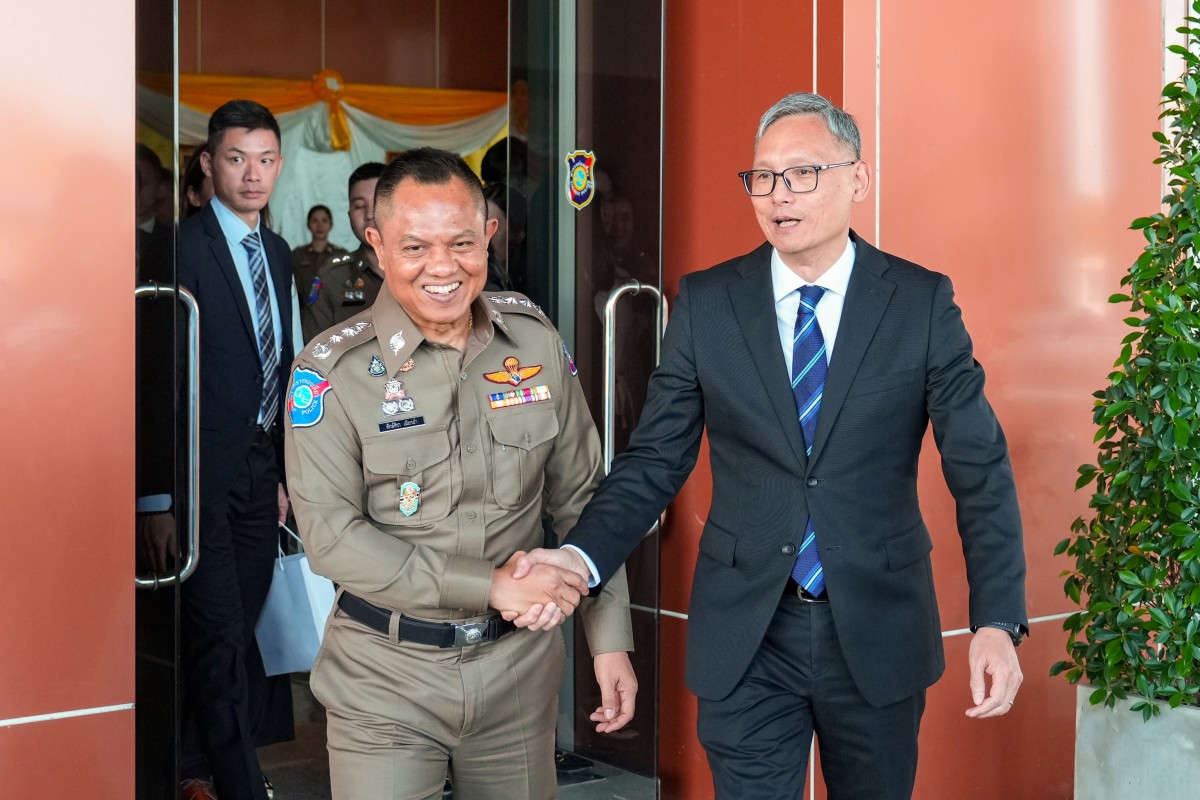 Hong Kong’s Undersecretary for Security Michael Cheuk Hau-yip leads a six-member task force to meet with representatives of Thailand’s Police at the Royal Thai Police Headquarters in Bangkok. Photo: Sam Tsang
Hong Kong’s Undersecretary for Security Michael Cheuk Hau-yip leads a six-member task force to meet with representatives of Thailand’s Police at the Royal Thai Police Headquarters in Bangkok. Photo: Sam TsangBefore you read: Hong Kong government officials met with police in Thailand about bringing back residents trapped in Southeast Asian countries. Victims may think they are taking goods to Japan or Taiwan before changing destinations
Think about it: How can Hongkongers protect themselves from Southeast Asian job scams?
Hong Kong’s Security Bureau sent a task force to Thailand last week to meet local authorities amid a resurgence in residents being lured to Southeast Asia under false pretences and forced into illegal work.
City authorities warned that kidnappers had recently changed tactics, pretending to arrange for victims to take goods to Japan or Taiwan before changing destinations at the last minute.
They have come under renewed pressure to ensure the return of Hong Kong residents believed to be held captive following the rescue of mainland Chinese actor Wang Xing, who had been kidnapped along the Thai-Myanmar border.
Hong Kong law enforcement had received 28 requests for help from residents believed to have been trapped in Southeast Asian countries and unable to leave from the second quarter of 2024 to January 14, the Security Bureau said.
Scams on the rise in Hong Kong thanks to technology and lack of regulations
Some of the remaining cases, aged 21 to 43, involved reports of restrictions to freedom of movement, but the victims said they remained safe and able to communicate with their families or the task force.
Undersecretary for Security Michael Cheuk Hau-yip, who is heading up the six-member group, said the Thai government was very concerned.
“We have been in contact with the relevant authorities all along. Given the latest developments, we aim to communicate with them in person, understand the situation and then seek feasible ways of getting assistance from them,” he said before the task force set off.
“I hope that we can ensure the safe return of all Hong Kong people. This is our ultimate goal.”
Cheuk also noted that scam syndicates behind the kidnappings had changed tactics, going from promising lucrative bogus jobs to instead arranging victims to transport goods.
“They ask you to ‘take goods’ to Taiwan, Japan or other places. But, at the last moment, they say the destination has been changed to somewhere in Southeast Asia,” he said.
The undersecretary for security also said most victims already had established contact with perpetrators, including receiving electronic flight tickets, before leaving.
“Currently, none of the victims informed us that they were unexpectedly abducted while travelling in Thailand or other Southeast Asian locations. Most individuals were picked up as part of prearranged circumstances,” he said.
Former district councillor Andy Yu Tak-po, who has helped family members of kidnapped Hong Kong residents, said he had received many pleas for assistance.
Can you trust your ears? Cyber criminals are using AI voice tools in new scam
One relative accompanying Yu, who only identified herself as Mary, said she had only received a 30-second call since her loved one went missing for “a job” 2½ months ago and she hoped the task force would be able to save those being held.
“[I am] very emotional but truly overjoyed. We have always felt very hopeless about things, but now we can see a glimmer of hope,” she said, holding back tears.
Yu said he had noticed a change in tactics by scam syndicates.
“Now they entice victims by hiring them as purchasing agents in Japan and Taiwan, which is a very common job for a lot of content creators, thinking it is just a normal job,” he said.
“But the catch is that they arrange for victims to work in Thailand for a period of time through ‘intermediaries’ in Hong Kong, who assist in booking overnight flight tickets and travel with the victims to Thailand. After that, the victims go missing.”
Yu urged authorities to adopt similar measures to Taiwan, where officials urged potential victims against travelling to Southeast Asia, while also identifying intermediaries who often accompanied people on flights.
